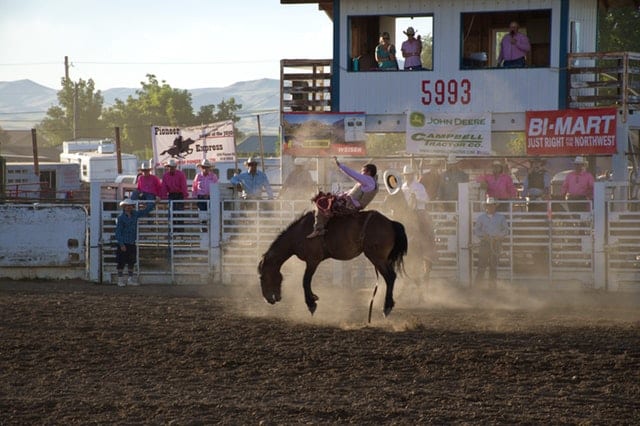
Have you ever been to a rodeo?
Do you have any strong feelings about a rodeo?
This is one of those things that can bring about a strong emotional reaction, depending on what culture you live in.
We’re going to look at what it means to have different norms and beliefs, and how this can vary significantly by culture.
You’re going to gain the English skills to be able to have conversations about deeper and important topics like this one in your ESL classroom and out in the real world.
Get Your Transcripts Today!

Make sure you understand every word you hear on All Ears English.
Bring your English to the advanced level with new vocabulary and natural expressions.
Subscribe and get the transcripts delivered by email.
Learn to speak naturally with the American accent.
Click here to subscribe and save 50%
Experiences and Interpretations Can Be Very Different
Lindsay recently attended a rodeo out in Denver, and posted on Instagram about it.
She was very surprised at the many comments that she received after her post, many of which were negative.
When asked what comes to mind at a rodeo, many people had rather negative thoughts such as “cruelty to animals” or “animals should not suffer to entertain humans.”
These comments were surprising because though there are moments where you may wince, that’s not Lindsay’s overall impression of the rodeo. It’s just one part of it.
When the baby calves are lassoed then it may evoke some negative emotions, so that part is understandable.
There are many other positive aspects to a rodeo though such as saddled and bareback riding, and barrel racing which are all fine.
Yes the lassoing of the baby calves and the modern bull fighting can be hard to watch, but this isn’t all that a rodeo is about.
This may be a cultural thing and it may have to do with the insight or even perception that you have about things such as a rodeo if you are from that culture.
So this makes for a very interesting topic to focus on, as there can be very different perceptions of things that you may find normal in every culture.
Considering Cultural Relativism
There are many articles and pieces out there that speak to the safety of a rodeo.
Though rodeos of the past may have been inhumane or animals weren’t treated fairly, that has changed recently.
There may be parts that you don’t like such as the baby calves being lassoed but there is more to an event like this.
This ultimately becomes a matter of cultural relativism–that is to say what is normal in one culture may not necessarily be normal in another.
You may accept something as part of your culture, but somebody else would question it and find it odd.
Some examples of this may be normal to you, but may seem odd to others.
- Bullfighting in Spain: This is a very normal part of the culture in Spain, and a very well attended event. This is like a rodeo in that some people feel that it’s cruel to animals. Yet this draws people from all over the world every year.
- Many of the same people who hate the rodeo also eat steak- what’s the difference? The thought process may be that meat is part of the food supply, and so it’s acceptable. It may seem cruel to see animals at a rodeo, while you may find it to be perfectly normal if you have gone your whole life.
- What about eating dog? Why do we eat steak and not dog? There are some cultures that eat dog and other animals that are “off limits” in other cultures. There are some countries that don’t eat cows because it’s a sacred animal. Who is to say what is normal or acceptable to eat? It’s all about what is normal or acceptable in your own culture.
These are the kinds of topics you guys want to be able to talk about in English to hit that highest level of fluency.
You have your own beliefs and norms, and those may vary by culture.
It’s interesting to compare and contrast these differences from culture to culture.
Rodeo As Part of a Phrase
You may have very distinct thoughts on rodeos depending on your culture and beliefs.
You may have even heard the word “rodeo” used in conversation, when really it has nothing to do with the actual event.
A good example of this is the phrase “it’s not my first rodeo” or “it ain’t my first rodeo.”
This is a common phrase used by natives, and it’s more based on slang rather than a literal meaning.
So what does this phrase actually mean?
This is used when someone who is new at something gets unwanted advice from someone who is more experienced.
This is usually said in a more condescending way, and therefore comes off negatively.
This is similar to another phrase which is “man-splaining” which is when a man over explains something to a woman.
In both instances, the suggestions or advice may come from experience or opinion, but it is given in a rather unflattering or condescending and negative way.
Though the advice may be offered in a seemingly helpful way, it comes off negatively.
So the perfect response to shut this down is to say “this isn’t my first rodeo,” which is to say “I’ve got this!”
Everyone loves to give advice, and sometimes you just have to know how to shut it down or turn it away in a positive light.
Other Ways To Say This
You can always say “it’s not my first rodeo.”
This certainly gets your point across and it shuts down the unwanted advice in a sassy but effective way.
There are other ways to say this that can help to get the point across in the same sort of way too.
- I know what I’m doing: This is direct and to the point, and there’s really no disputing it. You can say this if you want to politely get the other person’s attention and stop the unwanted advice or commentary. This is particularly effective if you do know what you’re doing or you have done this before.
- I got it covered: It’s a bit less direct but it says what you need it to say. You don’t need any extra help or coverage, because ultimately you have it all under control. This will usually stop the unwanted advice or offer to help in an effective way.
- I’m all set: You can literally stop somebody in their tracks if you say this. It may be a bit harsh, but really it’s all about saying it how it is. You are telling the person that you don’t want anything from them because you are all set with what you need.
- I know all about it: This tells them what they need to know. You have knowledge or experience in this area, and so you are in good shape. This can effectively stop the person from offering any additional help because you already know what you need to know about it.
These phrases can be very helpful in shutting down any extra and unwanted advice.
Sometimes you just want to let others know that you have things under control, and these can all help you to accomplish that.
Roleplay To Help
In this roleplay, Michelle is buying a car for the third time. Lindsay is trying to sell her the car.
Lindsay is a used car salesperson, and Michelle is buying a car from her.
Lindsay: “Oh hello. Welcome to Vonn’s Cars.”
Michelle: “Oh thanks. I am just looking around.”
Lindsay: “Anything in particular you’re looking for?”
Michelle: “Oh just looking for something with a light footprint, good gas mileage, you know, I am thinking a lot about the economy and my wallet these days.”
Lindsay: “Oh well you know, if you want to save money on gas, have you considered a Tesla?”
Michelle: “Oh yeah I had one a few years ago. “
Lindsay: “You know, the Roadster can do 0 to 60 in 1.9 seconds and can get up to 250 mph.”
Michelle: “Oh I know. It’s not my first rodeo”
Lindsay: “Okay I see. Well feel free to look around. Holler if you need help.”
Takeaway
The only way to build new vocabulary is to go out and actually experience it!
It can be quite interesting to attend an event such as a rodeo if you are living in an English speaking country.
If you’re not then you can get this same sort of experience through movies to understand the key ideas here.
There is something very special about being in a place and finding the very essence of that place.
It may be the rodeo in Denver, or Fenway Park in Boston, because every place has an essence to it.
Find the essence of the place that you live, and really enjoy it.
These are the experiences that help to shape us, and they can boost our vocabulary in the process.
When you have the skills to be able to talk about a controversial topic in English like the rodeo in the US or bullfighting in Spain then you will have reached that high level of fluency and connection.
If you have any questions, please leave them below in the comments section.
We’ll get back to you as soon as we can.








